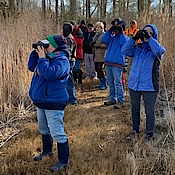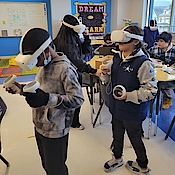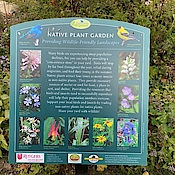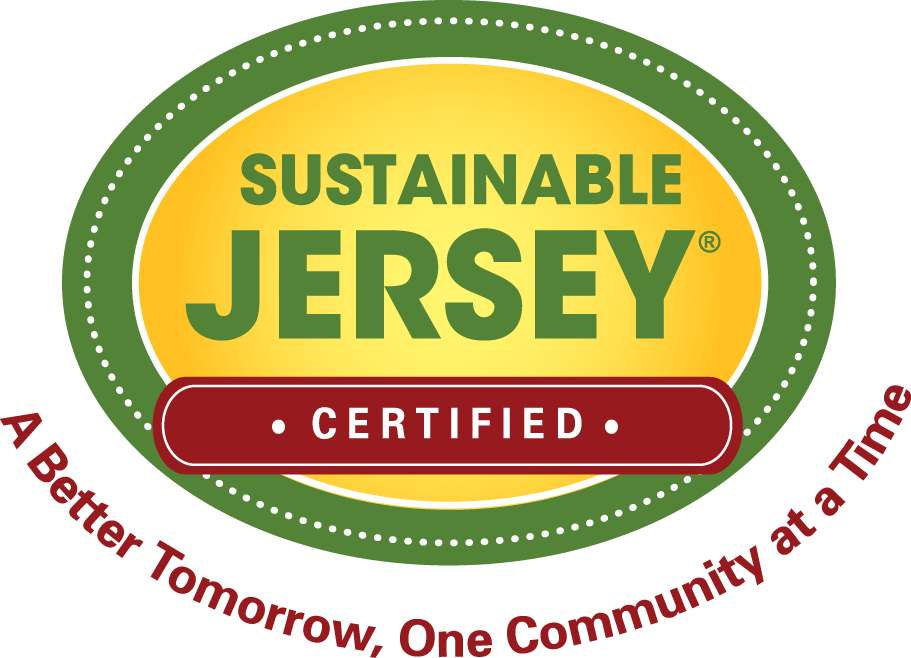Sustainability in Action
In the Summer 2025 issue of the Sustainable Jersey Newsletter:
- Soaring Back: Downe Township Educates about the Bald Eagle (Cumberland County)
- Three New Brunswick Schools Transform Learning with Digital Innovative Classrooms (Middlesex County)
- Pollinators, Plants, and People: Ringwood Builds a Sustainable Borough (Bergen County)
- Elizabeth Avenue School Hosts Sustainability-Focused STEAM Event (Somerset County)
- New Guide Helps Municipalities Launch Community Solar Automatic Enrollment Programs
Soaring Back: Downe Township Educates about the Bald Eagle (Cumberland County)

Residents gathered at historic Union Hall for a special lecture hosted by the Downe Township Green Team celebrating the comeback of the bald eagle—a species once nearly wiped out but now thriving again.
The event featured experts who have devoted their lives to wildlife protection. Kathy Clark, Chief of the New Jersey Fish and Wildlife Department Endangered and Nongame Species Program, spoke about the New Jersey Bald Eagle Project and the crucial role of everyday people-volunteer nest monitors-who keep watch over these majestic birds from egg to fledgling. Vicki Schmidt, a State Licensed Wildlife Rehabilitator, shared the behind-the-scenes work of rescuing injured animals and reminding residents what to do if they ever come across hurt or sick wildlife.
For Downe Township Green Team Chair Liz Cowley, the event carried special meaning. “Downe has been at the center of bald eagle population restoration since the beginning. It's part of our history,” she said. “Organizing this event was important because I wanted our community to hear all about it and how our resident eagles are doing today and what they can do to help.”
Downe Township has a close connection to New Jersey’s bald eagle recovery story. Nestled in the southernmost corner of Cumberland County, its vast woodlands and wetlands provide the perfect backdrop for eagle habitat. Long known to birdwatchers and hikers, these wild spaces became a lifeline for a species once on the brink.
In the 1970s, New Jersey’s bald eagle population had nearly collapsed. DDT had devastated the species, leaving just one nest in the entire state—hidden away in Downe Township. But science, policy, and human dedication changed that trajectory. The ban on DDT, stronger clean water protections, and years of effort by state biologists and volunteers slowly brought the eagles back.
From that lone nest in 1982, the New Jersey’s bald eagle population has soared to more than 260 active nests in 2024. Each is carefully monitored by citizen scientists who track egg laying, hatching, and fledging, providing biologists with the data they need to ensure the continued success of these iconic birds.
The story of the bald eagle is one of resilience, but also of partnership—between scientists and communities willing to spend long hours in the field. Groups at the forefront of the work include the Conserve Wildlife Foundation of New Jersey and the New Jersey Department of Environmental Protection Fish and Wildlife Endangered and Nongame Species Program.
By hosting the lecture, the green team didn’t just educate, it reminded residents that they live in a place where community and habitat meet. As one of only two towns in Cumberland County that are certified with Sustainable Jersey, Downe Township continues to pursue actions that make the town more sustainable, efficient, and livable, while keeping an eye on the wild neighbors who have called it home for centuries.
Three New Brunswick Schools Transform Learning with Digital Innovative Classrooms (Middlesex County)

In just five years, artificial intelligence (AI), robotics, drones, 3D printing, and self-driving cars will transform our world in ways that were once unimaginable. Today’s students must be ready to thrive in this rapidly changing future--and New Brunswick Public Schools is meeting that challenge head-on.
A commitment to innovation has earned three schools in the district—Blanquita B. Valenti Community School, McKinley Community School, and New Brunswick Middle School—recognition as Digital Schools Stars, part of their Sustainable Jersey for Schools silver-level certification.
Gregory Pardo, Supervisor of Instructional Technology for New Brunswick Public Schools, explained the impact, “Transformative tech brings learning to life in ways that wouldn't be possible otherwise. I’m fortunate to be able to empower the next generation of thinkers. Innovation thrives when we give students the tools to build their own futures, not just consume what others create.” Pardo is joined by Auslin Williams, Media Specialist at McKinley Community School; Jeanna Anzalone, Media Specialist at Blanquita Valenti School; and Anthony Mwangi, Computer Science Teacher at New Brunswick Middle School—together, they are leading this impressive effort across the district.
At McKinley Community School and New Brunswick Middle School, students explore cutting-edge technologies in Verizon Innovative Learning Labs, created in partnership with Arizona State University (ASU), Digital Promise, and Verizon Innovative Learning. The labs feature advanced tools including 3D printers, virtual reality (VR) headsets, microprocessors, and programmable robots like Spheros. Angie Beneciuk and Rich Ciancia, New Brunswick Public Schools STEAM (science, technology, engineering, arts, and mathematics) Specialists, support the lab programs and work closely with the teachers in those centers, helping them leverage technology to create student-centered learning experiences.
Students choose from four ASU-designed STEAM curricula—AI and Robotics, Digital Product Innovations, Immersive Media, and Smart Solutions—encouraging them to apply emerging technology to real-world challenges.
At Blanquita B. Valenti Community School, a Verizon Innovative School, students have access to a dynamic media center and makerspace. Here, K-8 students take robotics electives and STEAM courses that develop skills in computational thinking, coding, and design. They work hands-on with Sphero Indi cars, Bee Bots, Ozobots, and drones, while teachers use the space for professional development with VR, augmented reality (AR) and AI.
Learning comes to life in these spaces. For example, in Mrs. Williams’s robotics class, students program robots to navigate mazes. Mrs. Keenan’s eighth-graders explore the City of Chicago through VR to deepen their study of The House on Mango Street by Sandra Cisneros. At McKinley, a 4th grader used CAD to design and engineer her own drinking cup, while other students 3D-printed a pet water dish and created personalized mugs.
Pardo underscored the importance of shifting instructional models to meet the needs of today’s learners, “Students are not built for one-size-fits-all instruction. We are building on teacher-centered classrooms to create student-centered experiences, embracing non-linear learning paths. The Digital Schools Star provides a good roadmap for schools to implement these changes.”
The Digital Schools Star recognition, part of the Sustainable Jersey for Schools program, celebrates schools that are leading the way in integrating technology into teaching, learning, and operations. For New Brunswick Public Schools, it’s more than a badge of honor—it’s a commitment to preparing every student to thrive in a future defined by innovation. Each school received 15 points toward their Sustainable Jersey for Schools certification and Digital Schools Star recognition by completing the Digital Innovative Classroom action. Watch their videos: A Reflective Journey into Blanquita Valenti School and McKinley Community School; Using Technology in Transformative Ways at BBV and McKinley Community School; and New Brunswick Middle School Innovative Learning Lab.
Pollinators, Plants, and People: Ringwood Builds a Sustainable Borough (Bergen County)

Ringwood Borough’s Green Team, Sustainable Ringwood, has turned the grounds around the Ringwood Public Library into living classrooms, demonstrating how native plants, pollinator habitats, and composting practices can create healthier landscapes and stronger communities.
With the support of a $10,000 Sustainable Jersey grant funded by The PSEG Foundation, the green team and its partners established a native plant garden and expanded an existing pollinator garden. These spaces not only beautify the community but teach residents about the power of sustainable landscaping—how native plants support wildlife, reduce water usage, enrich soil, and thrive without pesticides or chemical fertilizers.
The project engaged more than 500 residents through hands-on activities, expert presentations, and community celebrations. Visitors learned about the harm caused by pesticides and fertilizers, pledged to avoid them in their own yards—115 residents have signed the pledge so far, and those with pollinator-friendly gardens are proudly displaying “Pesticide Free Zone” signs provided by the green team. A growing network of Ringwood homeowners is now cultivating native plant gardens, reducing chemical use, and sharing seeds through a new community seed bank housed at the library.
Jennifer Hsu of Sustainable Ringwood, said, “The most exciting outcome of this project is how it brought people together. From the library to local families to residents who pledged to garden sustainably, we’ve created a network of neighbors who are invested in making Ringwood greener and more resilient.”
The gardens have become focal points for community engagement. Programs have ranged from child-friendly art activities at the pollinator garden opening to composting workshops designed for families. Sustainable Ringwood also partnered with Harbee Beekeeping for a live hive demonstration and hosted expert talks by leaders in the field including: Dr. Douglas Tallamy, a scientist, environmentalist, and author of Nature’s Best Hope; Deb Ellis, Chair of the Essex Chapter of the New Jersey Native Plant Society; and Don Torino, President of the Bergen County Audubon Society. The partnership with the library has extended the impact through events like Winter Sowing workshops and moth observation nights.
These programs inspired residents of all ages to see their backyards as part of a larger ecosystem. A summer photo contest, “Native Plants and Their Wildlife Friends,” further encouraged families to get outdoors, search for pollinator-friendly plants, and capture nature in action.
A strong partnership between the green team and the Ringwood Public Library ensures that the gardens and seed bank will continue to support educational programs, while community contributions—from mulch donations to a TREX bench earned through plastic recycling—have added lasting value. Ringwood Borough, a bronze-certified Sustainable Jersey community, plans to expand the gardens, host Earth Day events, and partner with schools on sustainability projects. By creating a native garden in the heart of town, Sustainable Ringwood has planted something bigger: the seeds of long-term environmental stewardship.
Elizabeth Avenue School Hosts Sustainability-Focused STEAM Event (Somerset County)

Elizabeth Avenue School transformed its annual STEAM night into a celebration of sustainability, attracting more than 300 participants and 100 families. The event, themed “Sustainability–Metamorphosis of Thought,” blended Science, Technology, Engineering, Arts, and Math (STEAM) with activities that encourage environmental responsibility and community action.
Supported by a $2,000 Sustainable Jersey grant funded by the New Jersey Education Association (NJEA), families engaged in nearly 20 interactive stations. Student-led activities ranged from rock painting for a butterfly-shaped sustainability garden, energy conservation demonstrations with watt meters, and recycling challenges, to owl pellet dissections, 3D nature art, and a sustainability pledge wall. Fifth grade energy ambassadors showed families how to compare the electricity use of incandescent and LED bulbs, while asking them to pledge to conserve energy.
Vice Principal Edgar Vazquez Molina celebrated the event’s impact, “The STEAM night and art show was a success, highlighting the power of community and creativity and educating and inspiring our families. More than 20 Franklin High School students and three science clubs volunteered at the event, building intergenerational connections and supporting younger students in their sustainability journey. The Elizabeth Avenue School Green Team also hosted a book swap and organized the butterfly rock garden.”
“The event strengthened community spirit and engagement with sustainability and encouraged students to become sustainability advocates,” explained Shana Ponna, the Elizabeth Avenue School science teacher who helped organize the event. “By fostering a culture of sustainability within STEAM, we equip students with the tools and mindset to solve real-world problems and contribute to a more sustainable future.”
The event not only brought families together around STEAM, but also strengthened partnerships with local organizations including the New Jersey Wing of the Civil Air Patrol, Rutgers Society of Women Engineers, Somerset County 4-H, the Franklin Township Environmental Commission, and Clean Ocean Action.
Elizabeth Avenue School, in the Franklin Township Public Schools, achieved silver-level Sustainable Jersey for Schools certification in 2025 and their first Digital Schools Star recognition. The STEAM event contributed points toward this achievement, read the Elizabeth Avenue School 2025 Certification Report. The Sustainable Jersey NJEA grant cycle is open and accepting grant applications through October 31, 2025: Apply for a Grant.
New Guide Helps Municipalities Launch Community Solar Automatic Enrollment Programs

Community Solar Automatic Enrollment Programs give municipalities the ability to automatically enroll low- and moderate-income (LMI) residents in community solar, ensuring guaranteed savings on their electric bills. Residents can opt out at any time without penalties or fees.
Why does automatic enrollment matter? While residents can sign up for community solar individually, participation among LMI households has lagged—even though 51% of all community solar capacity in New Jersey is reserved for them. Despite strong outreach efforts by many municipalities, subscriber organizations have struggled to fill this capacity since the program’s launch in 2018. Barriers include challenges reaching LMI audiences and community distrust stemming from past misleading solar offers.
New Jersey has worked to remove these barriers. In 2025, consolidated billing went into effect, allowing subscription charges and bill credits to appear directly on a resident’s utility bill, simplifying participation for LMI households. This simplified process and the new automatic enrollment program will allow community solar to become an important tool for combating rising electric bills.
To help municipalities take the next step, Sustainable Jersey created the Municipal Community Solar Automatic Enrollment Guide, made possible through a grant from New Jersey’s Clean Energy Program. This new resource provides step-by-step instructions, key considerations, and insights from both municipal and resident perspectives. It also includes an overview of the implementation process to help local leaders assess whether automatic enrollment aligns with their community’s goals. Get the guide.
By making community solar more accessible, New Jersey’s Community Solar Energy Program aims to ensure that the benefits of clean energy reach all residents—especially those who need them most. To learn more about the Community Solar Energy Program.
